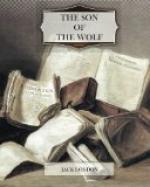Weatherbee loved to discourse blatantly on politics, while Cuthfert, who had been prone to clip his coupons and let the commonwealth jog on as best it might, either ignored the subject or delivered himself of startling epigrams. But the clerk was too obtuse to appreciate the clever shaping of thought, and this waste of ammunition irritated Cuthfert.
He had been used to blinding people by his brilliancy, and it worked him quite a hardship, this loss of an audience. He felt personally aggrieved and unconsciously held his muttonhead companion responsible for it.
Save existence, they had nothing in common—came in touch on no single point.
Weatherbee was a clerk who had known naught but clerking all his life; Cuthfert was a master of arts, a dabbler in oils, and had written not a little. The one was a lower-class man who considered himself a gentleman, and the other was a gentleman who knew himself to be such. From this it may be remarked that a man can be a gentleman without possessing the first instinct of true comradeship. The clerk was as sensuous as the other was aesthetic, and his love adventures, told at great length and chiefly coined from his imagination, affected the supersensitive master of arts in the same way as so many whiffs of sewer gas. He deemed the clerk a filthy, uncultured brute, whose place was in the muck with the swine, and told him so; and he was reciprocally informed that he was a milk-and-water sissy and a cad. Weatherbee could not have defined ‘cad’ for his life; but it satisfied its purpose, which after all seems the main point in life.
Weatherbee flatted every third note and sang such songs as ’The Boston Burglar’ and ‘the Handsome Cabin Boy,’ for hours at a time, while Cuthfert wept with rage, till he could stand it no longer and fled into the outer cold. But there was no escape. The intense frost could not be endured for long at a time, and the little cabin crowded them—beds, stove, table, and all—into a space of ten by twelve. The very presence of either became a personal affront to the other, and they lapsed into sullen silences which increased in length and strength as the days went by. Occasionally, the flash of an eye or the curl of a lip got the better of them, though they strove to wholly ignore each other during these mute periods.
And a great wonder sprang up in the breast of each, as to how God had ever come to create the other.
With little to do, time became an intolerable burden to them. This naturally made them still lazier. They sank into a physical lethargy which there was no escaping, and which made them rebel at the performance of the smallest chore. One morning when it was his turn to cook the common breakfast, Weatherbee rolled out of his blankets, and to the snoring of his companion, lighted first the slush lamp and then the fire. The kettles were frozen hard, and there was no water in the cabin with which to wash. But he did not mind that. Waiting for it to thaw, he sliced the bacon and plunged into the hateful task of bread-making. Cuthfert had been slyly watching through his half-closed lids.




